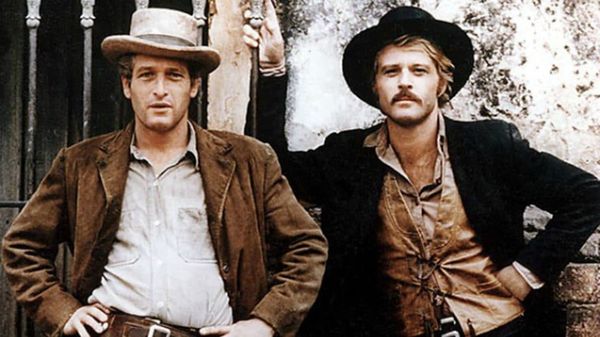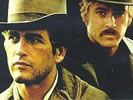Eye For Film >> Movies >> Butch Cassidy And The Sundance Kid (1969) Film Review

The two lovable outlaws Butch Cassidy (Paul Newman) and The Sundance Kid (Robert Redford) rob trains and banks all over the American West until the law gets too close. Rather than face the prospect of jail, they flee with wayward schoolteacher Etta Place (Katherine Ross) to South America, where they continue to hold up banks, this time in broken Spanish. Their high life on the lam comes to a close as the Pinkerton detectives (an early species of bounty hunter) turn up in Bolivia.
The film opens, self-consciously sepia-toned, more brown-and-white than black-and-white, immediately suggesting tattered "Wanted" posters, with a long take of The Sundance Kid - Redford was a virtual unknown then - glaring balefully from underneath his stetson, as he plays cards, followed soon afterwards by one of the first big lines of the film, "Hey kid, how good are ya?" as he displays his marksmanship.

The film doesn't pass into colour until Butch and Sundance cross a wide expanse of prairie, and the gradations of colour well up, dissolving this initially gritty vision of America's past. Watching the first half hour of this movie, you start to understand why people love it. The pairing of the silent, brooding tiger-like masculinity embodied by Sundance with the quick wit of Cassidy is a classic formula. This and what was perhaps the unexpected humour of the film at the time of its release, when Westerns appeared so earnest, is undoubtedly what made it a runaway hit.
Butch and Sundance's decision to flee America also made a timely parallel with the draft dodgers in 1969, lending it a particular cultural relevance. The film has aged remarkably well - Redford and Newman's performances still feel fresh and amusing. The scene that strikes me as being very much of its time is the one where we first see Sundance and Etta together. The audience is unaware they are already lovers when Sundance sneaks into her house and waits in the darkened bedroom. When he surprises her, she gives no sign that she knows him, as he orders her to undress at gunpoint. While this scene is artfully shot, it carries too much of the threat of sexual violence to be erotic, and yet its intention is unclear. When Sundance and Etta finally embrace, the tension is dispelled by her petulant remark: "You know what I wish? That once you'd get here on time." As a female viewer, this scene sits uneasily, out of line with the rest of the film's light-hearted quality.
Like her co-stars, Ross is subtly charming as the bored schoolteacher who abandons it all to throw in her lot with the outlaws. Some of her funniest scenes are those where she attempts to coach Butch and Sundance in the necessary Spanish vocabulary to carry on robbing banks in Bolivia. While Butch has no gift for languages, he seems determined to master Spanish, while Sundance merely glowers darkly in a corner, scoffing at any attempt to learn.
The film is well paced, moving smoothly towards its dramatic finale, a feat that is not easily managed when much of the story is comic and the dialogue filled with snappy one-liners. My only criticism is that the soundtrack seems badly dated, a minor flaw in what is still a masterful, entertaining film.
Reviewed on: 13 Jun 2006

















